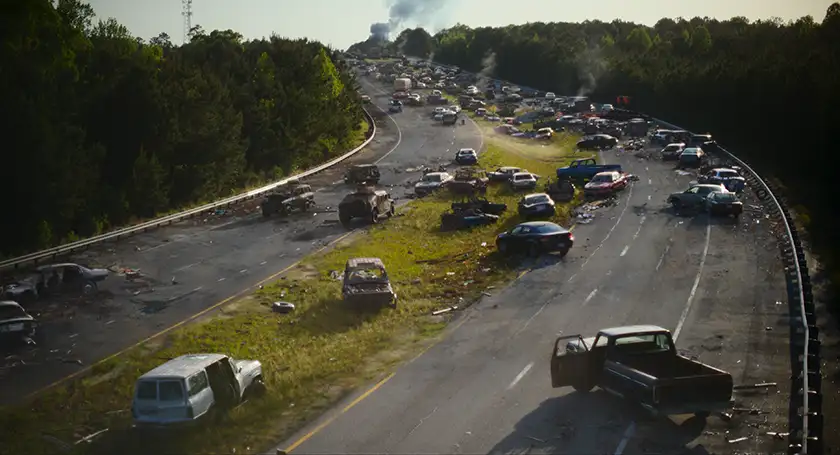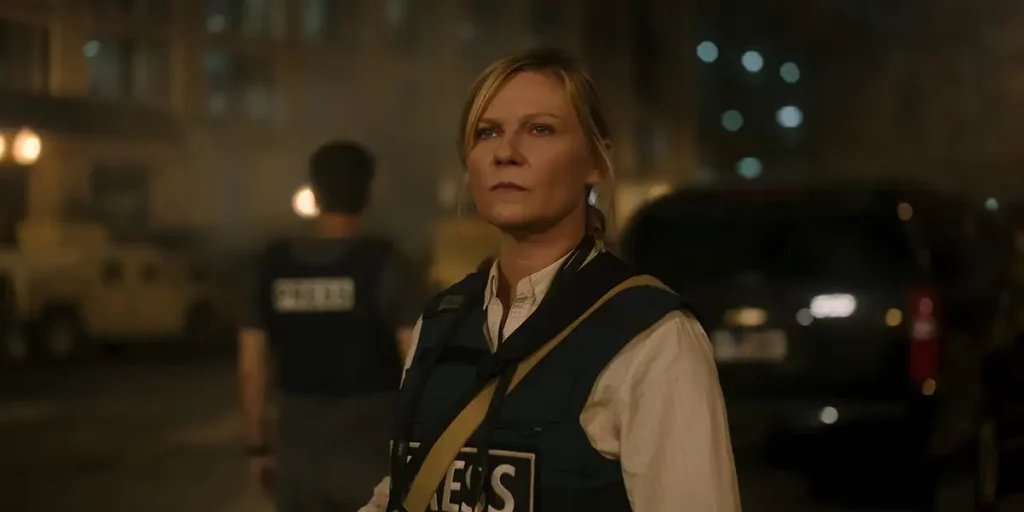Alex Garland’s Civil War eschews a hard political lean to look at both the senseless violence and depressing numbness of a dark, divided nation.
I swear, if Alex Garland is truly stepping away from filmmaking like he says he is, I’m gonna start a civil war of my own to get him back. His latest in a string of great films, Civil War, takes place in the near future as the United States is in a second Civil War, which has set the nation literally and figuratively on fire. Through the dystopian chaos, renowned photojournalist Lee (Kirsten Dunst, The Power of the Dog) and her team travel to Washington D.C. to try and interview the president (Nick Offerman, Dumb Money) before he’s potentially killed by the separatist Western Forces of Texas and California. Tagging along is aspiring photographer Jessie (Cailee Spaeny, Priscilla), who’s exposed to the harshness of the war and her potential profession.
Unless you’ve been living ten feet under a rock – in which case, may I please join you to get away from all this? – you know that the notion of a violently divided America feels as close to reality as it has for a very long time. At my screening, I was even asked by someone if I think it’s okay to make a movie like this right now. (I’d personally say it’s the perfect time to do it.) But what surprised me about Civil War is that, in an age where so many movies and shows have gotten searingly specific when dealing with sociopolitical issues (which is far from a bad thing), this film deliberately broadens the cause of its violence and dread to not fit into any one political camp.
Civil War is not a film about why extreme division happens; it’s about the personal impact of division at its worst. The focus is not on which side is right or wrong, or even what anyone is truly fighting for, because that’s not the point. For hardened fighters and innocent civilians alike, once the conflict has become widespread and severe enough, the purpose behind it all fizzles away. Civil War is a warning against that kind of nihilistic effect where all that remains is the need to survive and maybe maintain a shred of humanity. It’s about how conflict affects people, not how people affect conflict.
The Western Forces, despite what I had handily assumed going in, are not the film’s antagonists. Their actions make them unmistakably ruthless terrorists, but our main characters never side with or against them, and vice versa. On the contrary, Lee and her team are helped out by multiple sides of the war as the impartial journalists they are. They filter the war through a lens of objectivity, even if that objectivity itself is tested the more they endure to reach their goals.
Civil War is a surprisingly character-centric movie despite the mass destruction going on. Kirsten Dunst greatly embodies how numb her character has grown to the world around her, specifically when she approaches a tense or shocking situation like it’s an everyday occurrence. Her developing relationship with the inexperienced, more hopeful Jessie is the heart and soul of the film. I was worried about having a … for lack of a better phrase, kid sidekick on board for the journey, but the script and Spaeny’s performance give Jessie a nuanced evolution into a more world-worn person, just as Lee’s worldview is softened by the reminder of who she used to be that she sees in Jessie.

As horrific as the bloodshed in Civil War is, its most unnerving moments come from the more subdued, quieter character and world details. You understand so much of how this new America works just through passing visuals and how characters react to them. Drivers instantly know how to weave around a pile of destroyed cars on a highway. Idle talk can be had with rockets blasting across the distant night sky. The sight of a happy, suburban town totally unaffected by the war is the most visibly jarring sight the main characters come across, only for them to then see how precarious that prosperity is.
It’s also clear that this war has let the country become a playground for the worst of humanity. Jesse Plemmons only has one extended sequence, but he makes it count by portraying a character who’s allowed to run rampant with his monstrosities thanks to the ongoing anarchy. He made me yearn for the warm embrace of his character from Breaking Bad, and I feel icky just for saying that. His scene is another warning of how senseless conflict of any kind lets someone like that off the leash, and it’s just one of many different perspectives that the road trip nature of Civil War allows for.
This is easily the most stylistically downplayed and straightforward of Garland’s films, which doesn’t surprise me. I wasn’t expecting any sequence as WTF as his mutated bear in Annihilation or his … Russian doll finale in Men. His direction is bleak, unflinching, brutally realistic, and the most authentic portrayal I can possibly imagine of an actual second American Civil War. I obviously can’t know that for sure – and sweet Jesus, please let us never find out – but I had zero trouble believing it. The chaotic violence, captured with piercingly loud sound design from Oscar winner Glenn Freemantle, is terrifying, and almost no minute of the film comes across as heightened or watered down.
At the same time, Garland and his usual cinematographer Rob Hardy choose the right moments to add a surreal glow or deathly silence to a sequence. Oddly enough, the most otherworldly, off-putting scene is not during a disturbing moment, but rather one of the very few blissful interactions between Lee and Jessie. Which, once again, speaks to how death and paranoia are so common for them that it’s the reprieve that feels otherworldly. It also gives Garland his rare chance to go to town with the kind of mirror/reflection imagery he loves, and you know he was going to milk that for all it’s worth.
There’s almost no score in Civil War, which works to let the imagery and sounds speak for themselves … but I could have used one in place of the many rock needle drops peppered throughout the film. These don’t match at all with the grittiness of any sequence in which they’re used. Maybe they’re meant to be ironic, but they take away far more than they contribute if that’s the case. It’s also a little weird that California and Texas of all states aligned when they’re so culturally opposite. I’m guessing this was done to further avoid vilifying one specific side of the political spectrum, but it still requires a bit of suspension of disbelief to believe it could happen. I can do it, but not everyone will.
I’m sure many will dislike Civil War for not taking their political stance- oh, uh, I mean any political stance. And listen, I appreciate when films are more blatant with their leans. Film is a form of expression, so it’s totally fair game for filmmakers to express their personal viewpoint as long as they’re not trying to force you to agree. But that doesn’t make films like Civil War less valuable, because a lot of truths and needed stories are universal, and a lot of the points are made stronger because there’s no political lean.
Sure, that stops Civil War from being a groundbreaking story, but its worldbuilding, dialogue, character work, and visuals let its themes hit harder than a lot of films that make similar points. And, with Americans being so at odds with one another, a film that’s this hard-hitting while staying politically neutral may be the wake-up call some people need … That’s the optimist in me talking. The growing cynic in me says this will be forgotten once everyone’s pissed off by something else again. Regardless, Civil War is a white-knuckled yet disarmingly personal experience that I’m not going to forget any time soon.
Civil War will be released globally in theaters and IMAX on April 12, 2024. Read our reviews of Alex Garland’s Men and Annihilation, and of war photographer Lee Miller biopic Lee.

